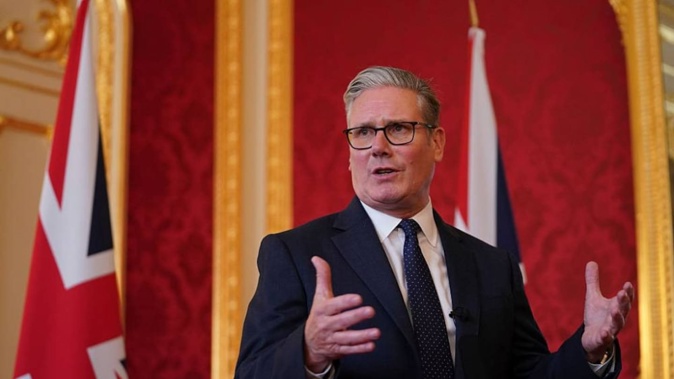
Prime Minister Keir Starmer vowed to lead “the fight of our lives” against a surging far-right in Britain as the annual conference of his Labour Party kicked off with him politically weakened.
Although he led Labour back to power in Britain in July last year, after 14 years in opposition, scandals and policy missteps have already raised doubts about his future.
The four-day gathering in Liverpool, northwest England, comes amid chatter about a possible leadership challenge and follows two recent high-profile departures from his Government.
The conference, which ends on Thursday, takes place with Labour lagging well behind the upstart anti-immigrant Reform UK party led by anti-European Union firebrand Nigel Farage, in national surveys.
Labour is trailing Reform by 12 points, while Starmer’s satisfaction ratings have hit the lowest recorded by Ipsos for any prime minister going back to 1977.
Starmer said today that the party had “got the fight of our lives ahead of us”.
“We’ve got to take on Reform, we’ve got to beat them. The effects will be there for generations,” he told the BBC.
He also called Reform’s plan to make migrants reapply for new visas with tougher rules “racist”, adding it would “tear our country apart”.
‘Phase two’
Despite some success for his handling of United States President Donald Trump and helping co-ordinate European support for Ukraine, Starmer has endured a miserable first 14 months domestically as Prime Minister.
Britain’s sluggish economy means a tax-raising Budget is reportedly looming, while Starmer has been forced to U-turn on welfare reforms and scrapping energy benefits for pensioners following anger among Labour’s left-wing base.
Small-boat arrivals of undocumented migrants are at record levels, fuelling support for Reform.
Starmer’s attempts to reboot his government earlier in September were overshadowed by Angela Rayner’s resignation as deputy prime minister for underpaying property tax.
Starmer then sacked Peter Mandelson as Britain’s ambassador in Washington following further revelations about his friendship with the late sex offender Jeffrey Epstein.
“His leadership is in crisis,” said political scientist Steven Fielding.
“The conference isn’t really going to resolve that. It’ll give people occasion to air their discontent with Starmer,” he told AFP.
The Gaza conflict is also likely to present another conference headache.
Around 100 protesters gathered outside the venue to denounce the Government’s designation of campaign body Palestine Action as a terror group. Police said they made several arrests.
Defend Our Juries, the group organising the protest, accused Labour leaders of trying to “shut down all the debates that members wanted to have on these issues during their conference”.
One 72-year-old lifelong Labour member, Alan, said it was “absolutely disgraceful” that the party “has not taken a stronger line against what is a fascist government in Israel”.
‘Hard road’
Australian Prime Minister Anthony Albanese offered words of support for his “friend” Starmer in one of the conference’s first speeches.
“Being a party of government means grappling with uncertainty and complexity ... it means making, and yes, owning tough decisions,” he told members.
Seeking to follow Albanese’s example, Starmer will look to spark a turnaround in his fortunes when he takes to the stage for the gathering’s keynote speech on Wednesday.
That will be “a pivotal moment because it’s an opportunity for him to lay out a clear vision of where he is taking the country,” said Patrick Diamond, politics professor at Queen Mary, University of London.
Manchester Mayor Andy Burnham has called on Starmer to put forward a more leftist vision for Labour, claiming in interviews last week that MPs have been urging him to run for leader.
Burnham, though, would first need to be elected to parliament, and then 80 MPs would then have to nominate him to trigger a contest, meaning Starmer is unlikely to face a challenge soon.
Today, in a fringe event to the conference, Burnham said he was worried about “a climate of fear within our party” and wanted a “debate” about the direction it was taking.
Embattled Chancellor of the Exchequer Rachel Reeves is the star attraction tomorrow, when she is expected to announce plans to try and revitalise the British economy, while new Home Secretary Shabana Mahmood is also due to speak.
Mahmood told the Sun on Sunday newspaper that she wanted to “reset” immigration laws to make sure that those who settle in the United Kingdom “are making a contribution to their wider community”.
-Agence France-Presse
Take your Radio, Podcasts and Music with you









